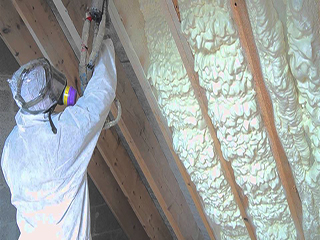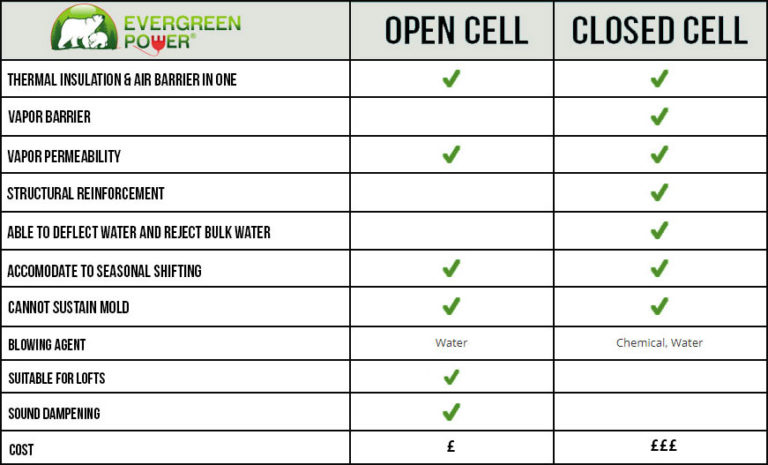There are two main types of spray foam insulation, open cell foam and closed cell spray foam insulation. But what is the difference? Well if you are still wondering “what is better open or closed cell insulation?” then you are in the right place, as we breakdown what insulation type is best for your project. At Evergreen Power, we have noticed a great number of people who have been misinformed or have not been informed by the difference between open celled and closed celled. As an official licensed accredited installer of Icynene insulation products, we have taken it into our hands to put open cell foam vs closed cell foam to the test. Still not sure? Contact our teams today for help to make the right decision!
Table of Contents
Why use Icynene open cell or closed cell?
Benefits of using either open cell vs closed cell spray foam insulation as opposed to traditional insulation include quick and easy application.
All About Open Cell Spray Foam Insulation
Air Barrier
Open cell spray foam insulation acts as an air barrier, therefore ensuring that there is no heat loss or air leaking into the property.
Health Benefits
Open cell spray foam significantly reduces dust and allergens in the home; improving indoor air quality.

Expansion
Open cell spray foam insulation consist of bubbles which burst, allowing air to fill the gaps. Due to this the spray foam can expand up to 100X its original size once applied, resulting in the foam covering hard to reach areas that traditional insulation cannot.
Density
Open cell spray foam is a light density insulation product. Our Icynene LD-C-50 is a soft, flexible spray foam that can be easily cut back.
Sound Insulation
Icynene spray foam insulation delivers high level of sound insulation by eliminating airborne sounds, creating a haven of peace and quiet within your home.
All About Closed Cell Spray Foam Insulation
Water Resistance
Icynene closed cell spray foam insulation deflects exterior water trying to leak in. As a result, rejects bulk water.
Thermal Insulation
Icynene closed cell spray foam insulation has a high U-value, offering an effective air leakage barrier – a much lower thermal conductivity.

Expansion
Closed cell spray foam structure is made up of small bubbles that are tightly compressed, which minimises the amount of air seeping into the bubbles. Therefore, the insulation expands up to an average of 30-50mm once applied.
Density
Icynene closed cell spray foam insulation is a rigid medium density foam ideal for continuous insulation solutions. As a result of having a greater density closed cell is a perfect insulator for resisting air and water leakage.
Structure Reinforcement
As a result of closed cell’s high density, it structural integrity to the building and adds support to the structure.

Importance of Knowing the Difference Between Open Cell vs Closed Cell Spray Foam Insulation
It is important to be aware of the difference between open cell vs closed celled spray foam insulation cost uk. Now lets get to it. If an installer was to install the incorrect cell type foam it could cause the insulation to work ineffectively. Worst case scenario installing the incorrect foam insulation can cause timbers to rot and air leakage. Hence, consult a professional installers before installation.
The Big Question – Open Cell foam vs Closed cell foam ?
After comparing the two types of spray foam insulations, you’d probably now want to know which is best for you and your home/property. Both Icynene open cell and closed cell spray insulation are effective insulators, with both working as barriers for air leakage. However, open cell and closed cell have their different uses.
When it comes to insulating a home – whether that’s a roof insulation or floor insulation – it is ideal to use Icynene open cell spray foam. This is due to the structural properties of open cell spray foam, which enables the foam to encapsulate air and expand. This therefore makes this type of spray foam roofing the perfect option for homes as it is breathable, preventing the timbers from rotting.
Whereas, Icynene closed cell is more suitable for projects that have a metal frame structure, such as: a crate: a boat; and other similar constructions. This is a result of Icynene closed cell having a rigid and dense structure, due to the foam minimising the air that is encased in its bubbles. This is ideal for preventing air and water leakage, however not so much for timbers. Hence, closed cell spray foam predominately being used on metal framed structures rather than homes.

A simple installation can take a turn for the worse quickly if the wrong type of foam insulation is used. Therefore as an official licensed accredited installer of Icynene, we will ensure that your insulation goes smoothly.





